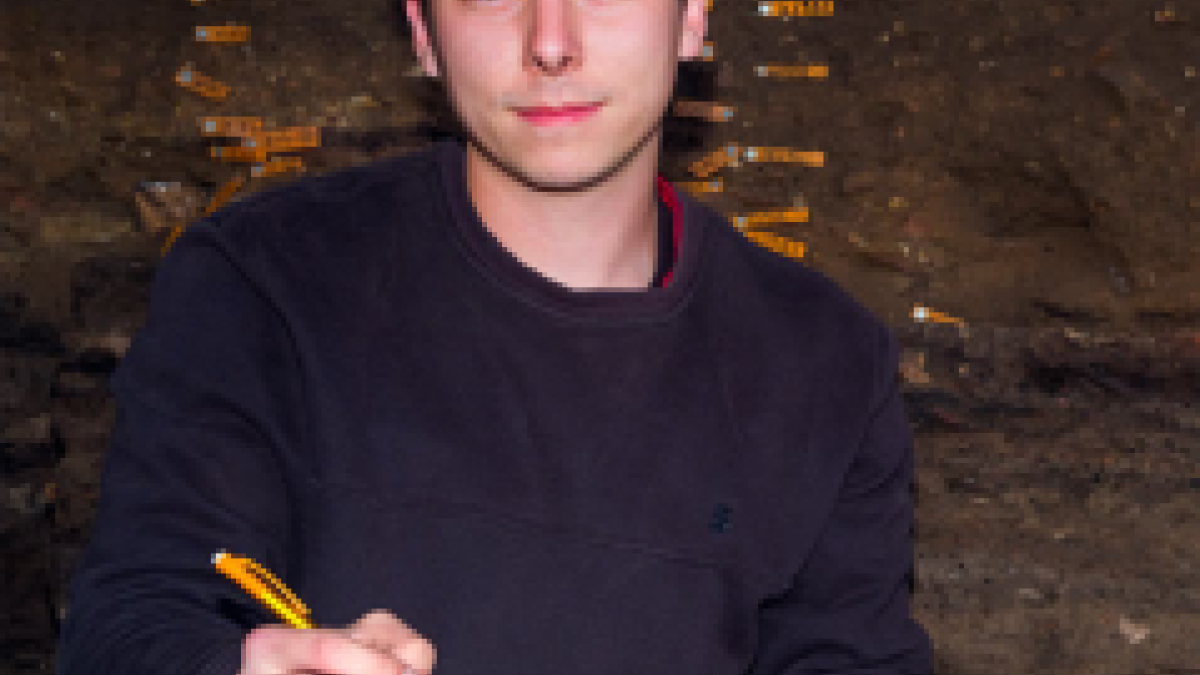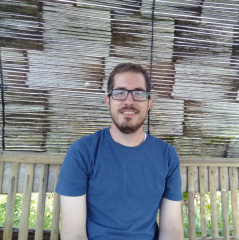ASU anthropology students, graduate to study abroad with Fulbrights

Patrick Fahey
Three students with the School of Human Evolution and Social Change at Arizona State University were honored with Fulbright awards this year.
The students will spend a year in Africa, the Philippines and a small island off the coast of China, where they will learn about other cultures, conduct research and teach English.
“Fulbright creates connections in a complex and changing world,” according to the informational website. “In partnership with more than 140 countries worldwide, the Fulbright U.S. Student Program offers unparalleled opportunities in all academic disciplines to passionate and accomplished graduating college seniors, graduate students and young professionals from all backgrounds.”
Patrick Fahey
Patrick Fahey is a graduate student at the School of Human Evolution and Social Change and affiliated with the Institute for Human Origins (IHO) through his advisor, Curtis Marean, an ASU Foundation Professor and research scientist. Fahey’s research is focused on paleoanthropology and zooarchaeology.
Fahey received a 2023–24 Fulbright to travel to South Africa and research the faunal (animal) remains from Pinnacle Point 5-6N (PP5-6N).
“I’ll be working in the South African Paleoclimate, Paleoenviroment, Paleoecology, and Paleoanthropology (SACP4) laboratory at the Diaz Museum in Mossel Bay and will form the basis of my PhD dissertation,” Fahey said.
PP5-6N is a Middle Stone Age rock-shelter site with well-preserved evidence of human occupations spanning the Late Pleistocene, around 90,000 to 50,000 years ago, during a time of cyclical and dramatic climate change.
“The humans who occupied this site during the transition from the interglacial phase where warm conditions similar to today prevailed, to the cold and arid glacial phase MIS 4, left records of how they adapted to the changing environment around the Cape region,” Fahey said. “They left innovative new tool forms, including potentially the earliest evidence of projectile hunting weapons and the earliest proliferation of symbolic material culture known. My research explores changes in human subsistence by reconstructing the types of animals humans hunted and how changes to environments and material culture affected the prey they pursued.”
Fahey, a skilled illustrator and artist, will also be helping to create a museum exhibit in the newly built Point Discovery Centre in Mossel Bay with information graphics that highlight the knowledge gained through research at Pinnacle Point, helping visitors better understand the evolution of modern human behaviors.
David Gowey
David Gowey
David Gowey is a graduate student at the School of Human Evolution and Social Change with a focus on sociocultural anthropology.
This was Gowey’s second application for a Fulbright. He said he was grateful for the feedback he received from the Lorraine W. Frank Office of National Scholarships Advisement and felt more confident applying in 2023.
Gowey received the Open Study/Research Award to work with schools in the central Philippines, in the town of Calinog.
Culture schools in the area teach members of the community, mostly children, traditional performing arts and crafts. Gowey’s research will focus on Panay Bukidnon epic chanting, known as “sugidanon.”
“The epic chants are stories about heroes and heroines with magical powers going on sailing voyages, fighting monsters and demigods, and finding spouses,” Gowey said.
“Each sugidanon epic can take several days to chant in full, and traditionally they're performed as bedtime stories. The students at the culture schools learn to perform them at contests and festivals for tourists. I want to study how the students learn these epics, what they get out of learning them and how they use them to represent themselves as Panay Bukidnon people.”
Gowey will use different components including Photovoice for his research. He will ask community members to record short videos explaining what they want others to know about their cultural practices. His hope is that the collection of stories can be used later on in the cultural schools.
The research he does during his Fulbright award will also go towards his dissertation research.
Along with the Fulbright, Gowey was awarded a paid summer internship at the National Museum of Natural History. For four weeks, he will get hands-on experience in museum methods, theory and working in discussion groups.
Quinn Hardt
Quinn Hardt graduated from Arizona State University in spring 2023 with a Bachelor of Arts in anthropology and a minor in Asian languages with a focus on Chinese.
Hardt received an English Teaching Assistant Award from Fulbright to teach and live in Kinmen.
“It is a small island approximately 6 kilometers from the coast of Fujian, China,” Hardt said.
While studying archaeology, Hardt said he felt supported by faculty and his advisor at the School of Human Evolution and Social Change.
Hardt completed an internship at ASU's Center for Archaeology and Society and was hired as a student worker at the Tonto National Forest. He took a graduate-level course from Associate Professor Matthew Peeples and participated in a research apprenticeship program with graduate student Britt Davis.
“Our project was constructing a plausible trade network spanning roughly the Belize Valley during the Preclassic Mayan period, looking into the formation of hierarchies and inequality by comparing frequencies of ceramic types in assemblages at a wide spread of sites dating to that period,” Hardt said. “Davis did most of the heavy lifting but was kind enough to credit me on the resulting poster, which was presented at the Society for American Archaeology.”
Hardt is also grateful for mentor Kathryn Ranhorn, assistant professor at the School of Human Evolution and Social Change, and Jiangnan Li, a teaching assistant of Chinese at the School of International Letters and Cultures.
“I got into archaeology because it's cool and the work itself is rewarding,” Hardt said. “I like looking at ancient stuff and trying to connect the pieces in plausible ways. I like constructing networks based on available data and then analyzing the structures.”
Written by Julie Russ and Nicole Pomerantz.
More Arts, humanities and education

ASU professor's project helps students learn complex topics
One of Arizona State University’s top professors is using her signature research project to improve how college students learn…

Award-winning playwright shares her scriptwriting process with ASU students
Actions speak louder than words. That’s why award-winning playwright Y York is workshopping her latest play, "Becoming…

Exceeding great expectations in downtown Mesa
Anyone visiting downtown Mesa over the past couple of years has a lot to rave about: The bevy of restaurants, unique local shops…


